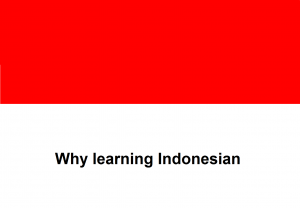Difference between revisions of "Language/Indonesian/Grammar/Why-Learn-Indonesian"
< Language | Indonesian | Grammar
Jump to navigation
Jump to search
m (Quick edit) |
|||
| Line 43: | Line 43: | ||
|Eu vou comer pão (amanhã) | |Eu vou comer pão (amanhã) | ||
|} | |} | ||
==Related Lessons== | |||
* [[Language/Indonesian/Grammar/Nouns|Nouns]] | |||
* [[Language/Indonesian/Grammar/Present-Tense|Present Tense]] | |||
* [[Language/Indonesian/Grammar/Past-Participle-in-Indonesian|Past Participle in Indonesian]] | |||
* [[Language/Indonesian/Grammar/Indefinite-Articles-in-Indonesian|Indefinite Articles in Indonesian]] | |||
* [[Language/Indonesian/Grammar/Possessive-Cases-in-Indonesian|Possessive Cases in Indonesian]] | |||
* [[Language/Indonesian/Grammar/Past-Tense|Past Tense]] | |||
* [[Language/Indonesian/Grammar/Verbs-in-Indonesian|Verbs in Indonesian]] | |||
* [[Language/Indonesian/Grammar/Negation|Negation]] | |||
* [[Language/Indonesian/Grammar/How-to-Use-Have|How to Use Have]] | |||
* [[Language/Indonesian/Grammar/How-to-Use-Be|How to Use Be]] | |||
Revision as of 17:16, 26 February 2023
Hello everybody,
If You think that Indonesian language is so difficult, you are wrong.
Indonesian is so easy for talking and easy for studying in common conversation.
We do not use tenses like past, present, future, etc.
We use the same structure. We just need adverb, like now, tomorrow, yesterday, etc.
Examples
| ENGLISH | INDONESIAN | PRONUNCIATION IN
ENGLISH |
BRAZILIAN
PORTUGUESE |
| I eat the bread | Saya makan roti | sah yah mah kahn roh tih | Eu como pão |
| I ate the bread (yesterday) | Saya makan roti (kemarin) | sah yah mah kahn roh tih (keh mah rihn) | Eu comi pão (ontem) |
| I will eat the bread (tomorow) | Saya akan makan roti (besok) | sah yah ah kahn mah kahn roh tih (beh sohk) | Eu vou comer pão (amanhã) |
